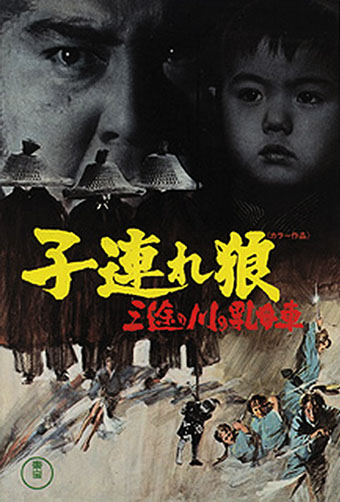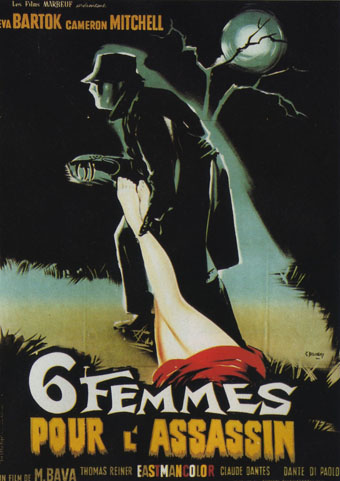Before yesterday, it’d been over a year since we’d heard even a tweet from Midnight Eye, the outstanding online publication with a new tagline: “Visions of Japanese Cinema.” The site’s been revamped and the current issue opens with Johannes Schönherr‘s interview with Masao Kobayashi, a producer who’s worked extensively in North Korea, even bringing in Yoji Yamada. At one point, “Yamada needed 50,000 extras. He asked: ‘Can you do that?’ They said: ‘Yes.'”
Also: Co-editor Jasper Sharp has a new book out, Historical Dictionary of Japanese Cinema, and the other co-editor, Tom Mes, launches a three-part feature, “The Lone Wolf Legacy”: “Created over thirty years ago, the six films in the Baby Cart series, based on the manga Lone Wolf and Cub (Kozure Okami) by Kazuo Koike and Goseki Kojima, have proven to be enduringly popular with audiences the world over. Ultra-stylish, extremely exciting and deeply enthralling: to some they represent all the best things Japanese cinema has to offer. Whether by themselves or through their equally funky bastard offspring Shogun Assassin, they have converted legions to the cause of Japanese film.”
Mes also reviews Steven T. Brown’s Tokyo Cyberpunk: Posthumanism in Japanese Visual Culture, “a long-overdue study of a genre that, as human interaction becomes progressively virtual and the virtual becomes progressively mundane, also seems to become increasingly relevant.”
The film reviews: Robin Gatto on Kihachi Okamoto‘s 1958 debut, All About Marriage; Bryan Hartzheim on Keisuke Yoshida’s Triangle, “one of the most overlooked gems from 2010”; and Mes on Sion Sono’s Guilty of Romance (2011) and Sogo Ishii‘s Isn’t Anyone Alive?, which “plays like a rerun of what Kiyoshi Kurosawa—just to remind you: the man whose best work Ishii once prefigured—was doing over a decade ago with Pulse and Barren Illusions, except drained of anything that made those films interesting and relevant, leaving only hollow form, motions to go through, clichés to reiterate.”
In the new issue of the Brooklyn Rail, you’ll find Aily Nash lunching with Deborah Stratman and discussing “the importance of failure, reenactments and narrative, Barbara Loden, Humphrey Jennings, Deborah’s sculptures and public projects, and seeking audiences beyond the rarefied experimental film and art worlds.”
Steve Macfarlane: “Starting with the title, cruel irony abounds in journalist David France’s How To Survive a Plague, a systemic dissection of the NYC-based gay community’s response to the AIDS epidemic and the lessons learned by its principal activists. Let’s get one thing out of the way: There is no magic bullet, no voilà!, no ‘how-to’ whatsoever—but perhaps there would have been, had the disease infected any visible section of hetero-heartland America.”
Also in the September 2012 issue: Benjamin Schultz-Figueroa previews Giallo Fever!, a series running at Anthology Film Archives from September 20 through 30, Leo Goldsmith looks back on Locarno 2012, William Corwin talks with Gillian Wearing “about various projects in her past and present, particularly her 2010 feature film Self-Made,” and Mary Hanlon reviews Zona: A Book About a Film About a Journey to a Room, in which Geoff Dyer meditates on Andrei Tarkovsky‘s Stalker (1979) and “examines Stalker’s psychic associations with the past and future, and its eerie similarities to passages and images of Postwar Europe, Chernobyl’s ‘Exclusion Zone,’ and writings on the aftermath of 9/11.”
More reading. “In the Wachowskis’ work, the forces of evil are often overwhelmingly powerful, inflicting misery on humans, who maintain their faith until they’re saved by an unexpected miracle. The story of the making of Cloud Atlas fits this narrative trajectory pretty well.” Quite the backgrounder in the New Yorker; Aleksandar Hemon also talks with Tom Tykwer and novelist David Mitchell.
At Débordements, Michael Guarneri conducts a fine long interview with Ben Russell, “mostly known for his award-winning debut feature Let Each One Go Where He May (2009). I had a chat with him a few days after he finished shooting his next attraction A Spell to Ward Off the Darkness (co-directed with his colleague and friend Ben Rivers) and a few hours before he started editing the material.” Via Catherine Grant.
David Bordwell analyzes David Koepp’s Premium Rush, “one of the best mainstream movies I’ve seen this year.”
Jeremi Szaniawski at Tativille: “Forty years after its release, twenty years after Fellini’s death which it announced better than any other of his films, Roma might have emerged as his most personal and, perhaps, greatest cinematic achievement.”
Part 3 of Wheeler Winston Dixon‘s study of “Dark Humor in Films of the 1960s” is up at Film International.
In the works. Hirokazu Kore-eda plans to adapt Kuchizuke, a hit play in Japan. Mark Schilling in Variety: “Shihori Kanja will reprise her stage role as a mentally challenged girl living in a group home, while Takayuki Takuma stars as her best friend, and Naoto Takenaka (Shall We Dance?) as her cartoonist dad. Takuma also wrote the play and heads the Tokyo Seleccion Deluxe theater troupe that first staged it.”
PopMatters has launched its week-long fall preview. More from Kat Murphy at MSN Movies and Movies.com.
Obit. “Michael Clarke Duncan, the hulking, prolific character actor whose dozens of films included an Oscar-nominated performance as a death row inmate in The Green Mile and such other box office hits as Armageddon, Planet of the Apes and Kung Fu Panda, is dead at age 54,” The AP reports.
More browsing? The cinetrix has got quite the roundup.
For news and tips throughout the day every day, follow @KeyframeDaily on Twitter and/or the RSS feed. Get Keyframe Daily in your inbox by signing in at fandor.com/daily.





